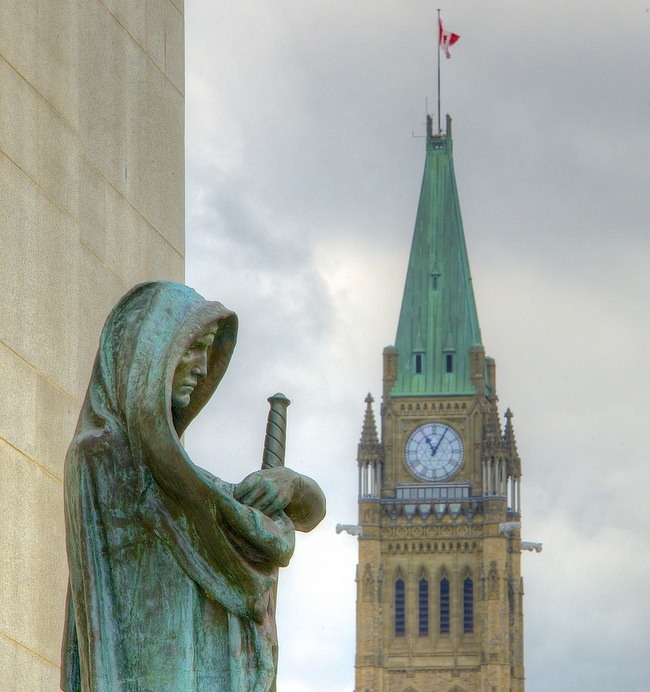This column is adapted from a speech delivered by Monia Mazigh at the conference “Arar+10: National Security and Human Rights a Decade Later” on October 29, 2014.
Let me start with a quote from George Bernard Shaw. The Irish playwright once said:
“Success does not consist in never making mistakes but in never making the same one a second time.”
The Arar+10 conference is important for three main reasons.
– To remember a personal tragedy that happened immediately after the events of 9/11 as a consequence of the reinforced security climate.
– To reflect about what really happened and what the esteemed Justices have recommended.
– To try to envision the future on the basis of what we learned from the Arar Inquiry and the Iacobucci Internal Inquiry.
Let me first of all express my gratitude to all Canadians who believed in human rights, justice and dignity for all.
It is those Canadians, some I know and some I don’t, who helped me when I was alone trying to bring my husband home. It is those Canadians — not knowing who Maher Arar was at the time — who stood up for justice. They didn’t know if he was a terrorist or not, they didn’t know if he was innocent or guilty. They didn’t know how religious he was and whether he prayed regularly five times a day, or how radical his views might be. They didn’t know anything about him. Nevertheless, those Canadians knew one thing: everyone has to be treated with justice. And obviously they saw in Maher Arar’s case only one thing: the utmost injustice.
If Canadians didn’t help me or listen to me, Maher Arar would have still been in prison, may now be dead or may have been thrown into the maze of a terrible civil war happening on the ground.
- Ten years ago, my son who was almost 3 years old, answered someone who asked, where does your Daddy work? “Daddy works for the Public Inquiry,” he replied innocently.
- Ten years ago, Maher Arar was a terror suspect, a rendition victim, a torture survivor.
- Ten years ago, the RCMP forces were in trouble for their involvement in Maher Arar’s case.
- Ten years ago as a family, we were trying to re-establish our life after it had been stolen from us.
- Ten years ago, the Arar Inquiry started, and light was about to be shed on some of the darkest chapters of Canadian history.
Today what has really changed and what has remained the same?
Unfortunately, Maher Arar became a symbol. A symbol of hope maybe… But a symbol of what can go wrong when fear takes over rationality, when stereotypes about Muslims and Islam make us feel somehow comfortable in our little bubbles and when politicians instrumentalize tragic events to justify political views and pass controversial laws.
But beyond all this, Maher Arar today is a broken man who wakes up every day in a bigger prison to glue together what remains from his old self.
The Arar Inquiry recommendations remained “lettre morte,” or like we say in English, “fell on deaf ears.” Even worse, new laws are being proposed to legitimize the same spying procedures and controversial exchange of information that led to Maher Arar’s first arrest in the U.S.
Meanwhile, not a single officer from the RCMP, CSIS, or CSEC came forward and made their mea culpa. Actually, it is rather ironic and very telling that one of the police voices we heard during the Arar Inquiry, Mike Cabana, is today the RCMP deputy commissioner.
Today, we live in a new era, still a continuation of the first war on terror started immediately after 9/11, but also where new vocabulary and entities emerged: ISIS, radical Islam, lone wolf.
Misunderstanding is still widespread; Islamophobia is a real threat and not another paranoia created by shady conspirators trying to invade the West with Sharia law.
So where do we go from here?
Personally, I never stopped speaking out against injustice. The Maher Arar case isn’t a horrible story of rendition and torture turned into a fairy-tale; it remains a real story with real consequences.
Abdullah Almalki, Ahmad Abou Elmaati and Muayyed Nureddin are other real stories with no fairy-tale ending. Omar Khadr, the first person since the Second World War to be prosecuted in a military commission for alleged war crimes committed while still a minor and who spent 10 years in Guantanamo, is still another concrete example of political revenge and legal vendetta. Security certificate victims are still in legal limbo.
Education is key. Educating ourselves about security issues, about human rights issues and about politics.
We lack education as we lack a healthy dose of skepticism about the real motives of our politicians and law enforcement forces.
Do we really need security for all or for some? Do we need security or an illusion of security?
Accountability. Ten years ago Maher Arar asked for accountability. Democracy goes hand in hand with accountability. But also we need accountability in implementing these recommendations. Perhaps we need a public campaign to ask the government to implement Justice O’Connor’s recommendations.
We need vigilance and most of all we need open and free minds to continue to discuss these issues with no fear and no censorship.
Monia Mazigh was born and raised in Tunisia and immigrated to Canada in 1991. Mazigh was catapulted onto the public stage in 2002 when her husband, Maher Arar, was deported to Syria where he was tortured and held without charge for over a year. She campaigned tirelessly for his release. Mazigh holds a PhD in finance from McGill University. In 2008, she published a memoir, Hope and Despair, about her pursuit of justice, and recently, a novel about Muslim women, Mirrors and Mirages. You can follow her on Twitter @MoniaMazigh or on her blog www.moniamazigh.com
Photo: Jamie McCaffrey/flickr



